|
Recap: Purpose and Context of the, Go and See, Series
Go and See, Part 8 Introduction
In Session 7 we took the time to consider and examine how taking inventory of our relationships, understanding the impact they have had on us, and then setting forth to invest our lives by investing in relationships with others is not optional--it is fundamental to living out the role we have been set in this time and place to fulfill. We also looked at the significance and impact that should come from believing that we are made in the image of a relationship-centered God. Then you walk through the steps of recalling key people in your life and creating a Faith Family Tree to reflect the ways God has used relationships to grow and guide you.
In the last session, most of your time was spent looking back to reflect on and record those people who have built your faith, passions, dreams our courage--honoring and summoning gratitude for those who have been instrumental in you becoming the you your are today. In this session, you are going to turn your reflective eyes forward and use them to create vision. In addition, we will take time to recognize the powerful role encouragement plays in investing in the lives of others. “May the God who gives endurance and encouragement give you the same attitude of mind toward each other that Christ Jesus had, so that with one mind and one voice you may glorify the God and Father of our Lord Jesus Christ” (Romans 15:5-6, NIV). If we believe there is a God who set us in our specific time and place, and divinely sets our paths to cross the paths of those around us, then we can believe that making a plan to invest in those relationships is honoring God and answering our calling. Yet, it is pretty easy to live more like we believe our interactions are accidental or random. Let’s choose to run from that lie by taking inventory of the relationships God has provided for us and then make a plan to intentionally invest in those relationships, even if it gets hard and complicated. Loving God is hard work. Sometimes loving people is even harder work. Sir Winston Churchill once said, “He who fails to plan, is planning to fail.” And this is just as true in relationships as it is in any other areas of our life. Thus, the objective of Session 8 is to help you make a plan for investing in the lives of others.
Reflection & Application
We need people. For real. This is a human and a spiritual need. As much as American culture tries to hold up the self-made man as the role model for success, I believe that deep in our souls we know that to be self-made and successful on our own, without the help of others, actually leaves us lonely, confused and quite frankly living a lie. Instead, the phrase, ‘no man is an island’ (from a John Donne sermon in the 17th century), is closer to the truth. Both the truth as we experience in reality, and also the truth we are called to biblically.
“No man is an island, entire of itself; every man is a piece of the continent, a part of the main; if a clod be washed away by the sea, Europe is the less, as well as if a promontory were, as well as if a manor of thy friend's or of thine own were; any man's death diminishes me, because I am involved in mankind, and therefore never send to know for whom the bell tolls; it tolls for thee” (John Donne, Devotions Upon Emergent Occasions).
As Christians, individual members that make up on body in Christ, our marching orders stand in contrast to many of the habits and patterns of thinking of culture. We are called to see that we need one another in order to live out the truths of our professed allegiance to Christ. We are called to spur one another on toward love and good deeds. We are called to live from a posture of humility so starkly different from the world’s point of view, that it stops people in their tracks and causes them to wonder what makes us different. We are called to relationships within the body that are so harmonious that the world will look at us and know love and see our identity as a follower of Christ impacts how we do relationships.
But how do we do this when it seems all hell is coming after relationships? How do we do this day in and day out when relationships can also be a source of pain, discouragement and brokenness? By determining to let our hearts, minds and souls be conformed to the mind of Christ. This is done through combing through God's truths, commands, and promises in the Bible on a regular and consistent basis--looking specifically for those passages that remind us, ‘no man is an island’ and that direct us on how to live like we believe what the Bible teaches. And by inviting the Holy Spirit in to provide the power to take every negative or unproductive thought captive in order to choose to believe the best of those around us. Lastly, it is done by recognizing that investing in relationships requires discipline and intentionality. None of which will likely come naturally or easily. We need all kinds of voices and people in our lives to help us run our race well: mentors, shepherds, friends, running-buddies, prayer warriors, and observers. Some of these people fall into the routine of our lives and we easily get time for them. Others cross our paths now and then, but not without effort and intentionality. Though we would all love to be the ones invited into intentional, deep relationships, it isn’t a practical way to think or live. If everyone is waiting around to do be the one invited, no one will be doing the inviting. In addition, just as you need others, others need you. Recognizing that others need you is paramount to taking hold of living this call to purposeful relationships commissioned to each of us by our creator. In a world full of messages that encourage selfishness, it is easy to dismiss the “other people need me” phrase as just that. However, in reality, when this concept is approached from humility and with a mind and heart that says, Others just might need my words of encouragement to keep persevering. If I hold back from believe others need me to serve and encourage them in their faith, I could be holding them back from using their gifts, then it becomes an act of selflessness. One’s physical body needs all the parts to be active and responding to each other in order to be whole and healthy. So too with the members of the body of Christ. You are one of those parts. And there is only one of you who can perform the unique function God designed you for. You are the only on who can meet the needs of the Church and the world in your specific places and relationships. I wonder if this is the harder belief to submit to believing and courageously living out. If you do not believe others need you in order to be encouraged, spurred on in their faith, or simply to feel as though they are not really an island, then you will not likely find the courage and strength to live this truth. Recognizing that who you, the words your speak, the model you set for others is needed for the health of the whole is a truth I think we too easily are tempted push under the rug out of insecurity and fear. And we need to stop doing so because people need us. They need us to actively live out the belief that in Christ, our words and actions have the power to set people free. We have been set free to set others free! The Word became flesh so that we could use our words and lives to stir one another up toward love and good deeds, encouraging one another as as the [last] Day draws near (Hebrews 10:24-25). Encouragement is a gift of strength we can give to all those around us. Let’s be people who recognize our need for others, their need for us, and the world’s need to see who our Father is through us. We have been designed and purposed to change the world. It starts by investing in one relationship at at time. Questions for Reflection:
Digging Deeper
Pinning our beliefs and actions to specific truths found in passages of the Bible is essential to remaining inline with the promises and character of God. Let’s go and see what the Bible says about our need for others, their need for us and the world’s need to for the all the members of the body Christ to be active in investing in relationships. Grab your Bible and read the following passages: Exodus 20:1-17, Mark 12:28-34, Colossians 3:12-15, and 1 Thessalonians 5:11. Highlight the verses or words that stick out to you.
If you grew up in church you likely had to memorize the 10 Commandments, found in Exodus 20:1-17. The commands given to Moses begins with those laws that relate to our relationship with God and end with those laws that relate to our relationship with others. Don't miss the significance of this. Healthy relationship with others begins with a healthy relationship with God. And building healthy relationships with others is paramount to obeying God and living into His promises. When was the last time you went back and looked at these ten commands, reflected on them or asked yourself if your actions and words most often demonstrate obedience to God in these areas? Grace certainly covers for our shortcomings and Christ death on the cross means salvation comes through belief in him, not living a perfect life. Yet, obedience to these commands hasn’t been dismissed. This is hard work. We won’t nail it every day. But our goal is to always keep working in the direction of holiness and obedience. It is important to notice that a majority of the commandments relate to relationships with others (all the other commands concern our relationship with God). In short, we cannot obey God without choosing to build relationships that show honor and respect to these commands. This obedience in relationships to others as a pathway to obedience to God is also found in Mark 12:26-34 & Colossians 3:12-15. In both of these passage we see that we cannot follow the “greatest” commandments if we are not living in relationship with others. Again we see the message, we need people in order to obey God. In even better news, we are not ill-equipped to do so. Love, through Christ and the power of the Holy Spirit, is continually being poured into us in order that we are able to fulfill these commands in all of our relationships. Not only that, but this Christ-powered love is our source of strength in persevering and in choosing to invest in relationships. We exist for God and for those who need God. Both the Old and the New Testament show us this. Furthermore, Christ came to give us the grace, power and tools to live out this divine purpose set in us for this side of heaven. The most practical place to start with living a life focussed on investing in relationships that meet needs and spur others toward love and good deeds is to our words. 1 Thessalonians 5:11 helps us to see that encouragement is how we build one another up because it brings out strength in people. Encouragement, though often done with words, can come in many forms: What you give (Mark 12:41-44). What you say (Proverbs 16:24). What you do (Mathew 25). How you choose to live (Ephesians 5:1-2).
Tool 8: Relationship Investment Plan
Tool Defined : Our lives are meant to spur others on toward love and good deeds. Not as an option. But as a need. This doesn’t often happen naturally. Yes, we may find ourselves in relationships no matter what, but it takes the Holy Spirit, discipline and intentionality in order to foster relationships that spur others on. Likewise, it takes perseverance and humility to invite others into our life with the specific intention of asking them to spur us on. Yet, finding just one person to be the sole source of your spurring isn’t the goal. This is for many reasons but on of them is because God has given us an entire body of voices to help guide us. Conversely, we shouldn’t be another person’s sole source of spurring. For all the same reasons.
We need to have relationships with those who can easily relate to our season of life, but we also need people who have gone before us. And some who are a season or two behind. We need people who are full or affirmation for what they see in us. Additionally, these affirming voices should be balanced with people who are courageous enough to help us see gaps or nearsightedness in our thinking or behaviors. As noted earlier, it is important to remember there is a danger in believing the lie that no one needs you or that your life is not impacting others. Seeing the truth of your life's impact and committing to growing more consistent in your intentionality toward investing in others who need your encouraging words and or who need to see the example of life that you live, will likely grow you in ways you can’t even envision completely right now. This tool is designed to allow you to take inventory of the people in your life right now, and examine if there are some types of voices missing in your time. It then instructs you to make a plan of how to intentionally create time and space to invest in a relationship(s) that you are in need of. Lastly, you will use this tool to outline the ways you can begin to intentionally invest in relationships that build others up because of you being a part of what they need to be spurred on.
Instructions:
1. Take 10-15 minutes to answer each of the following questions with names and reasons each name fits the answer. Then write an estimated amount of time you spend investing in these relationships. (Link to .pdf version below.)
2. As you examine the names and the amount of time you spend investing in these relationships, are there any that are needing more time and investing in? If so, create a plan for what that will look like in the coming weeks, months or year. Write it in the handout attached below or in your journal:
3. Take 10-15 minutes to answer each of the following questions with names and reasons each name fits the answer. Then write an estimated amount of time you spend investing in these relationships.
4. As you examine the names and the amount of time you spend investing in these relationships, are there any that are needing more time and investing in? If so, create a plan for what that will look like in the coming weeks, months or year. Write it in the handout attached below or in your journal:
*chart information adapted from,Restless, by Jennie Allen
Closing
Do you remember that little song you likely learned as a preschooler, This Little Light of Mine? One lyric says, “Hide it under a bush? Oh, no! I am going to let it shine.” How many of us are hiding our lights (gifts, purposes, visions) behind bushes because we are unsure as to whether our light really matters in the world? When we think of one little light under a bush (Which by the way would start a fire but, I digress.) it can seem insignificant. However, when all those lights that are sitting under bushes, (starting forest fires) instead, come out and join together to be one big light for the world to see, I guarantee our Abba in heaven looks down with pleasure and delight. Correspondingly, those around us will look toward the light and start asking questions about how they can have some of that life-changing light too.
When we breakdown the metaphor of the little light, we find that the song is really saying, This little life of mine, I am going to let it build up and encourage the people around me. In other words, I am going to believe and live out with words and actions the truth that my life is designed for impact. This impact begins with relationships--one relationship (one little candle being lit our brought out out from under a bush) at a time. Living this way will not be as easy as singing a song or learning what to do to have relationships, but will be birthed out of words and actions driven by intentionality, perseverance and an understanding that without relationships we can not obey all that God has asked of us. We love God well, by loving others extraordinarily.
1 Comment
Recap: Purpose and Context of the, Go and See, Series
Go and See, Part 7 Introduction Throughout the last six sessions of this study you have taken time to consider how the following guide you toward understanding and living out your purpose: God’s word and commands in the Bible, your life’s story (both the times of celebration and of trial), and your unique design (natural talents, personality traits, and spiritual gifts). Yet, there is one more aspect of our lives that needs examining and diagramming in order for us to fully comprehend one of the most essential elements of our purpose--relationships. From the beginning it is this relational component of our being that sets us apart from all other created things. Our internal desire and need for relationships was set into us by a God who “made us in His image” by breathing His spirit into Adam and then into Eve. In the beginning human and God walked together in the Garden and lived in relationship with one another. Our design from the start was intended to be a “helpmate” type of relationship with others and a “walking day-to-day” relationship with God. Even though the Fall wrecked the natural ability for these relationships to flourish, the root of our design is unchanged. We were made for one another. We were made in the image of a relationship-focussed God who operates out of an everlasting, triune relationship--Father, Son and Holy Spirit. Thus, taking inventory of our relationships, understanding the impact they have had on us, and then setting forth to invest our lives by investing in relationships with others is not optional--it is fundamental to living out the role we have been set in this time and place to fulfill. Everything in our being is oriented toward relationship--with God and others. Yet, for most of us, relationships can be one of the greatest sources of challenge, frustration and disappointment. However, the level of challenge found in growing and maintaining healthy relationships does not give us permission to dismiss the importance, necessity and significance of God’s design for us to live in relationship with one another. In fact, the challenges should signal to us the need to pull on the armor of God and fight for the relationships given to us by the God who sets each of us in our time and places for a divine and holy purpose. All the people in your life are known to God. All the relationships in your life are known to God. Believe that. Let it propel you toward choosing to go and see how each relationship in your past and present is guiding you toward knowing and living out your purpose. Each relationship is a endowment you have been given to invest in while the master is away. Each relationship is abounding with opportunities to invite Jesus into multiply your “loaves and fishes” to meet needs. Each relationship is a precious gift. Let that lens guide your reflections and prayers as you walk through this session. Reflection & Application Throughout my life I have been overwhelmingly blessed with teachers, coaches and colleagues who inspire me and push me toward goals I wouldn’t likely have worked toward had I not known them. Several months ago I ran into my high school track coach. We have kept up some over the years, but my visits to my hometown are infrequent to say the least. Thus, interaction with people from my upbringing are sparse. Yet, there is a deep well of gratitude and appreciation in my heart and soul for the ways the adults from that time in my life helped me become who I am today. As a result, I have determined that whenever I have opportunity to honor these people and thank them for how they shaped me, I will seize it. As our conversation unfolded that day, I knew this was an opportunity to be seized. So, as awkward as it felt, I let the words of gratitude and appreciation leave my heart and mouth. His response caught me off-guard. He looked me straight in the eyes and said, “You need to always remember that impact goes both ways. Your life has impacted mine more than you will ever know.” I was at a literal loss for words and small pools of water set themselves in the corner of my eyes. This was something I had never in my 36 years of life considered: The way I was living was impacting people older than me. The testimony of what I did as an adult was bringing courage and change to the people who had raised me. How could this be? Yet, this is the truth. Impact works both ways. Even though my motivation in the above conversation was to express my gratitude, I was gifted with a word of encouragement and a reminder that all the relationships in our lives are designed to provide strength one to another. And isn’t this what the second greatest commandment is all about? Teacher, which is the greatest commandment in the Law?” We absolutely cannot live out the second greatest commandment if we are not in relationship with others. One of the ways I feel most loved is when I am affirmed and encouraged by the sincere words of another. Words not about a specific accomplishments but ones that affirm that my unique design is recognized. Ones that reveal my life isn’t invisible. Those words that confirm that how I am living is pointing others to love, grace, and freedom. These are the words that I want to encourage others with as well. But I can’t get there unless I am living in a close enough relationship to others in order to be sincere, honest and truthful. In addition, I can’t see how others are building me up and fanning my flame if I don’t stop and reflect on who God has set in my path to guide me, build me up, and provide opportunities to live out my purpose. They say the first step in overcoming a bad habit is admitting you have one. I believe that can be turned around a bit and applied here: The first step to seeing the role relationships have played in molding and guiding you toward your purpose and giftings is admitting those relationships exist. The next step is listing each and defining the impact. And then seizing every opportunity to express gratitude and affirmation for the gifts these relationships have provided. Reflect on and answer these questions:
Digging Deeper To get started on this journey of placing relationships in our minds as gifts and guides toward understanding our purpose and vision, let’s go and see what the Bible reveals. Go grab your Bible (or click on the links here) and read 2 Timothy 1 and Psalm 78:6-8. Highlight the verses that stick out to you. A bit of context to get us started: The Apostle Paul is writing from prison, to his disciple, Timothy. It is important to note that Paul opens with words of encouragement and affirmation to his “son” in the faith, Timothy. In addition, Paul calls into recognition Timothy’s heritage and the role it plays in his calling (future assignments). Paul is building Timothy up through a very sincere recognition of the impact Timothy’s faith and perseverance has had on Paul’s faith. Secondly, Paul points Timothy back to the faith-heritage from which he has come. Both of these forms of affirmation stem from the relationships that Timothy can look to when he needs evidence of the Spirit living in him. One is biological, the other is not. Yet both are the reasons Timothy can confidently keep spreading the flame to others. In other words, our spiritual heritage and relationships are to light our way, give us courage and hope to persevere in our purpose and vision. “For this reason I remind you to fan into flame the gift of God, which is in you through the laying on of my hands” (2 Timothy 1:6, NIV). This session asks you to consider your heritage and its impact on your present and future. In addition, you will be asked to recognize and begin to plan for the legacy (impact) of your life. The relationship between Paul and Timothy reveals that one’s spiritual heritage may not be built from those who are genetically members of his or her family tree. Likewise, one’s legacy may extend beyond biological or familial relationships. Because in Christ, we are all one family--all adopted sons and daughters and heirs to the Kingdom. Our mission here is to help one another get there. We can take nothing with us from this world, except relationships. Hence the need to truly know how invest in relationships. In the passage from the book of Psalms, we see yet another reason to recognize, record and share the relationships that have built our faith, purpose, and gifts--that the next generation will know. Taking the time to record our faith story and the lineage of our faith may be instrumental in leading our children (biological or spiritual) to steady faith. We want to give your children their own faith and relationship with God, but we need to recognize that the roots of their growth begin with the relationship we have with them. So to for us. Our faith might be our own, but we were molded, equipped and guided by those who have gone before us. As we start leading others it can be easy to forget the relationships that lead us to where we are. Fighting to remember how the flames got started in our faith and sharing those stories with others is important and impactful because it fans the flame in our souls and the souls of those who hear it. Tool 7: Recalling Key People - Family Tree of Faith Tool Defined: Recording your lineage of faith. The aim of this activity is for you to create an image or timeline that reflects the ways God has used relationships to grow and guide you. In addition, taking ownership of your spiritual lineage--both what you receive and what you pass down--is incredibly beneficial to your Faith journey. Thirdly, this tool can illuminate for your soul God’s sovereignty over the relationships in your life, producing joy, thanks and praise for your creator. Also, recording your lineage of faith with an image or timeline is another way to set up stones of remembrance so that the generations to come can know and see the work and blessings of God in your life. Instructions:
Closing It is a battle to pursue understanding our gifts. It is a battle to intentionally pursue depth in relationships. It is a battle to believe that the effectiveness of the parts of the body of Christ hinges on the connectedness of each of those parts to Christ and to another. But we have all the tools we need for battle: Christ’s atoning blood that washes our conscience clear, the Holy Spirit who illuminates our calling and gifts, and relationships around us that tangibly tether us to our united mission: to display God’s glory, love and works to the little corner of the Earth we find our two feet planted for now. Ask the Holy Spirit to reveal to you more clearly all the ways he has entrusted gifts to you to love him more completely and love his people more intentionally. Pray for discernment to know in what area(s) of your life you need to intentionally pursue deeper relationships with others. For example, friends, neighbors, co-workers, mentors, parents, children, those who don’t know God yet, widows, orphans, or the elderly. Pray that you will know what obedience looks like for you and that you would know how to access the power and creativity to obey.
This is part 6 of the series, Go and See. These posts are designed to give you tools to "go and see" the ways God has designed you for impact right where you are, right now. If you are new here, head back to part 1, Stones of Remembrance, for the purpose and context of the series, along with the steps for creating a timeline. Then move to part 2, Thematic Labeling of Experience. Next, jump into part 3, A Clear-Conscience. And don't skip, part 4, Writing A Personal Essay. or part 5, Understanding Your Unique Design. Recap: Purpose & Context of Go and See
Go and See, Part 6 Introduction This week you are going to take all your learning from the last five weeks and synthesize it into three different categories that you can use to define your purpose, mission, and values. You will reflect on the experiences of your life, the people who have influenced you, your natural talents, spiritual gifts, personality traits, the ways God has worked in your life and the Holy Spirit’s power to provide understanding and clarity, to look for write out very specific and unique answers to the following questions:
The goal in this process is for you interpret of how your unique design determines your purpose, your dreams and goals (vision), and the values you must hold to in order to keep living out all three. We established in previous sessions that God designed every part of who you are, where you have been, where you are and where you are going. In addition, he uses all things to bring us to the goodness of redemption and grace of changed perspective (Romans 8:28). This is so that we can live according to the purposes he destined us to, even before we were born (Psalm 139). Because when we live out of a true understanding of who we are, we find an eternal assurance that propels us to look toward heaven, rather than to our circumstances, to discern our calling for such a time as this. Yet, it is necessary to remember that the path to living out your God-given dreams may sometimes seem to be inhibited by your circumstances. There will likely be periods of time when it looks like your gifts or purpose don’t fit the setting. Yet, no matter what, we can endure and persist even when circumstances seem to oppose your vision and dreams. In fact, it is very likely that in these most trying times that our values will be tested, refined, and become the roots on which are grown the behaviors we will adhere to when living out our purpose and vision in the present and future. I pray that this session will help you articulate your purpose, vision and values in writing. So that you can return again and again to an artifact that reminds you of who you were created to be and the specific assignments that you are gifted to complete by remaining steady in living a values-driven life. I pray that you will come to a new or greater picture of how to live in step with your God-given design, not matter what. Most of all I pray that you would see yourself as God sees you, and that from that point of view, you would operate with power, delight and wholeness. You were made to run your race right now. In Christ, you have everything you need to live on purpose, for His purposes, to fulfill your heart’s desires, for the Glory of God and the love of the people he has placed in your spaces. Reflection & Application Before we dig in, it is important that we define the terms: purpose, vision, and values. (The definitions provided below have been adapted from the training I received through the course, Servant Leadership RoundTable, from Triune Leadership.) The definitions of these words will be what you use to create statements that both reflect who you were designed to be, as well as provide a guidepost for you to return to again and again--especially when it comes time to say “yes” to this or “no” to that. In addition, during seasons when it is hard to see what God is doing in your life, these statements can help you look for how you can remain faithful (living out your values) and keep living out your purpose even when you can’t quite grasp the vision coming to fruition. A Purpose Statement: This statement answer the question, Why do I exist? (What do I do? For whom do I do it? What is the intended outcome or value? Why?) John 6:38 says, “For I have come down to heaven not to do my will but to do the will of he who sent me.” We are to look upward to grasp our purpose for our days here on this earth. It is written out in heaven, our job is to unpack it to live it out well right where we are now. A Vision Statement: This statement answers the question, What do I need to create? (What can I give to those around me for such a time as this? What pressing desire has God set on my heart?) A vision is a picture of a future you intend to create by using the gifts and unique design you’ve be given. It is a dream with a direction. It requires you to create an image or picture of your preferred future. You can determine how far away that future is: 5 years...15 years… 35 years… the end of your life. Values Statement: This statement answers the question, How am I going to behave? (What kind of character-traits do I want to grow?) Values are behaviors you will choose to live out no matter what because you believe they are in line with the purpose and vision given to you by your creator. These need defining and describing in order to be effective. Rooting each in Scripture breathes life into them and tethers them to truth. In this session, the book of Hebrews and the story of Joseph's’ life are going to help us go and see: Staying steady in purpose and committed to goals and vision requires living by values and the Holy Spirit, remaining faithful to using the gifts and vision entrusted to you right where you are. Steadiness is built on faith, truth and trust. Faith in a God that we cannot see, but who we can know. Truth that comes from God’s word and the Spirit, and revelation. Trust that our God has a good plan for each of us, even when our location or vocation don’t quite match what we imagine it should be. Let’s get started: Read through Hebrews 11-13 and highlight the verses that stick out to you. The goal is to go and see how Hebrews helps us to better understand purpose, vision and values. So, what instructions do you find in these chapters on knowing and living out your purpose, vision and values? Reflect on and answer the following questions.
Digging Deeper Hebrews has helped us to see that faith is the first step toward living out the purposes God has for us. By faith we move in the direction of his callings. By faith we step into the plans he has for us. Hebrews 12 reveals that fixing our eyes on Jesus is how we run our race. Jesus fixed his eyes on the joy of saving us from our sins at the cross. The vision of the outcome helped him to endure the cross. Lastly, Hebrews 13 defines for us the values (behaviors) that will help us to move steadily forward in our purposes. But let’s dig even deeper in to the story of a man who shows us what it looks like to remain steady in purpose, vision, and values, even when in unexpected and undesirable circumstances. Take few minutes to read Genesis 37:1-11. Highlight the verses that stick out to you. Then note the following:
Joseph’s Story Reveals Purpose, Vision & Values: Joseph, who is considered a prototype or prefigure of Christ, says in looking back on his 30 years of persisting in his calling while being a slave, says this: “God intended it all for good to accomplish what is now being done, the saving of many lives” (Genesis 50:20). We see in Joseph persistence, consistency and discipline in operating out of his giftings in all his circumstances. It is plausible to conclude: Joseph was persistent in honoring God with his life because he knew this was his purpose. He was consistent in devoting all that he did to God because he believed in the dreams and visions that were given to him. And he was disciplined in making decisions based on his values (not his circumstances or emotions or to please others), which likely altered his attitude and perspective on his circumstances. How was he able to stay so true to who God had made him to be despite the fact that he was in horrible circumstances due to jealousy and false accusations (and maybe a little bit because of his own haughtiness)? He had a vision (dream), given to him from God and he chose to live toward it even when it looked like the dream had died with the animal’s blood that was shed and drenched on his coat of many colors. And he was sold into slavery. We too can ask God to give us a picture, vision, or dream of what he has planned for us. We too should maybe plan on it taking a few years or decades for it to come to fruition. And to persist even when it seems maybe we aren’t where we planned to be. We can use all the tools from this study, along with asking for revelation and discernment from the Holy Spirit, to write out a purpose statement, a mission statement and a set of values that can guide us no matter the circumstances we find ourselves in. Tool 6: Purpose, Vision & Values Statements Tool Defined: Creating and documenting a purpose, vision and values statement for yourself or your family can be powerful in claiming persistence, consistency and discipline over the calling and giftings God has given you. It isn’t the tool that makes you able and powerful, but the Holy Spirit’s presence. However, these tools can help tether you to remembrance and guide you in decision making in times of high emotions, confusion or transition. Also, these tools can be like a mirror you can return to in order to rightly see who God has made you to be when you get a little bit lost. A reminder of the definitions of each:
Instructions for Writing Purpose, Visions & Values Statements: Take time to ask the Holy Spirit to be present with you as you reflect on the gifts (and calling) you took inventory of in part 5. Then use those to generate answers to the following questions.This process is meant to guide you in creating a purpose statement, a vision statement and a set of defined values that reflect who God has made you to be, what he has gifted you with and how both are going to be used to impact the people of this place and in this generation. Purpose Statement: This states the reason for your (or your family unit) existence and provides a guide for goal-setting. After examining the result of the tools you used to take inventory of your giftings and calling, answer the following questions incorporating the words, phrases and ideas from your inventory reflections.
To or for ____________________________________________________. So they can __________________________________________________.
Vision Statement: Based the result of the tools you used to take inventory of your giftings and calling, answer the following questions incorporating the words, phrases and ideas from your inventory reflections. The goal is to describe a vision of your preferred future. (You can determine how far away that future is).
Values: Definitions & Behaviors: These form the beginning of living a life of purpose on purpose. To be useful values need to be identified with a definition and in terms of specific behaviors. Based on the results of the tools you used to take inventory of your giftings and calling, consider what values will be necessary in order for you to live toward your purpose and vision, and to grow in your areas of giftings.
Closing Your gifts point you toward your purpose, vision and values. Have you discovered and unwrapped your gifts yet? It not, what is holding you back. Stop and pray for strength to fight the good fight of faith to uncover all the ways you have been designed to live out your purposes. Let the fact that God delights in you discovering all the ways he made you to meet the needs around, loving Him deeply and finding joy in his destiny for you propel you forward in your journey. Throughout the process of articulating in writing your purpose, vision and values, remember that you are on a journey to discover what was established before the beginning of time, your work is to excavate them, understand them, increase them and enjoy them. As you use words to hone in on clarity, also keep in mind that your circumstances don’t determine your giftings, purpose, vision or the ability to live out your values. Proximity to God does. Who you are, where you are is more significant than where you are and the circumstances around you. To circle back to Part 1, your purpose statement, vision statement, and list of values can be like stones of remembrance (Joshua 4), allowing you to remain steadily pointed in the direction God has your heart pointed toward. It is worth your time and energy to keep a record of these things. In the end, the ultimate purpose in walking through this session is for you to grasp the ways that Mark 6:30-44 is to be applied to your life: What do you have? How will you use it to “feed” the multitude in front of you? |
Jaclyn LoweenEDUCATION Links to all the, Go and See Study, sessions.
Archives
June 2018
|
||||||||||||||||||||||||||||||||||||||||
Proudly powered by Weebly


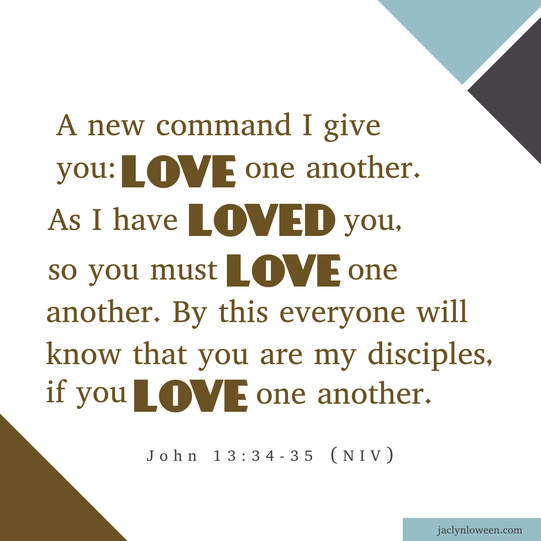
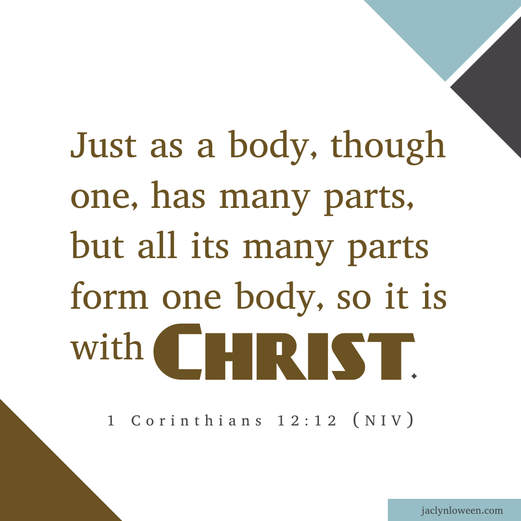
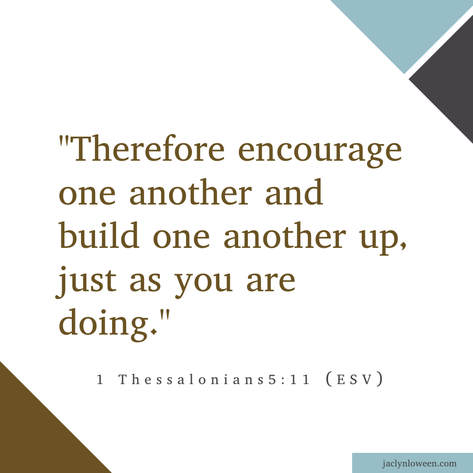
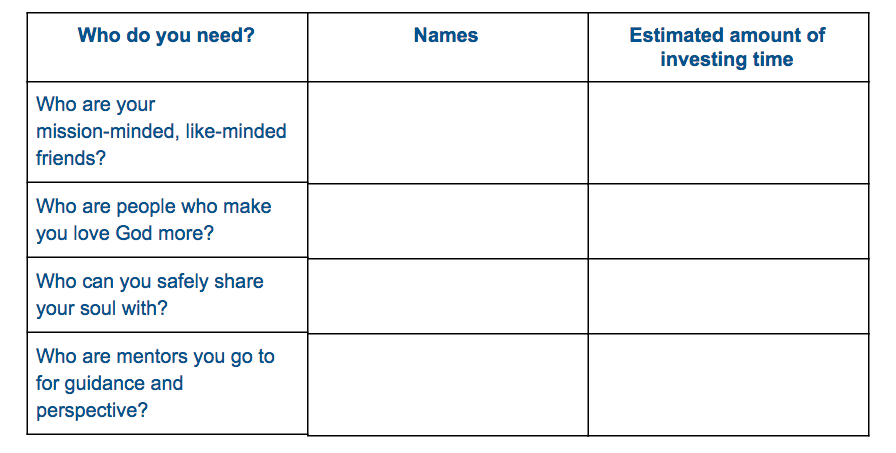

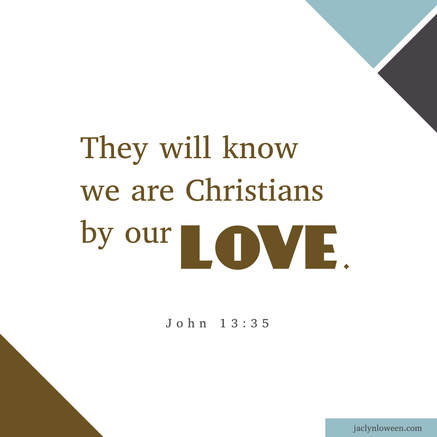



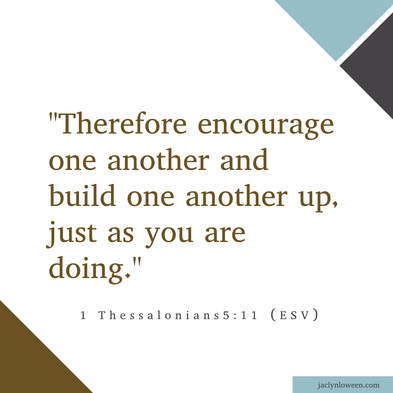


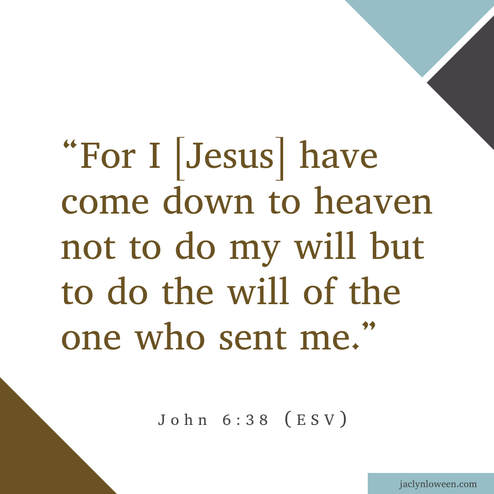
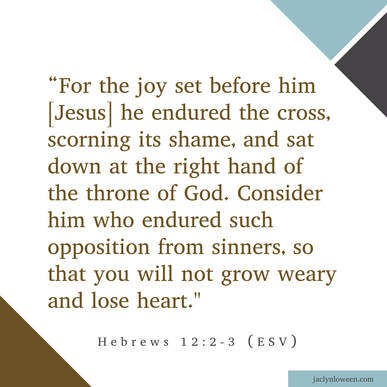
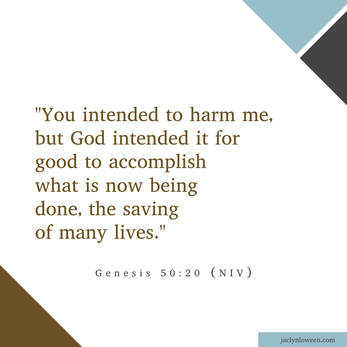
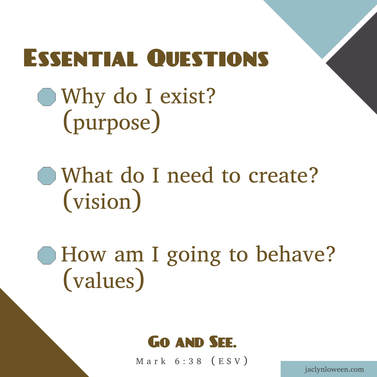
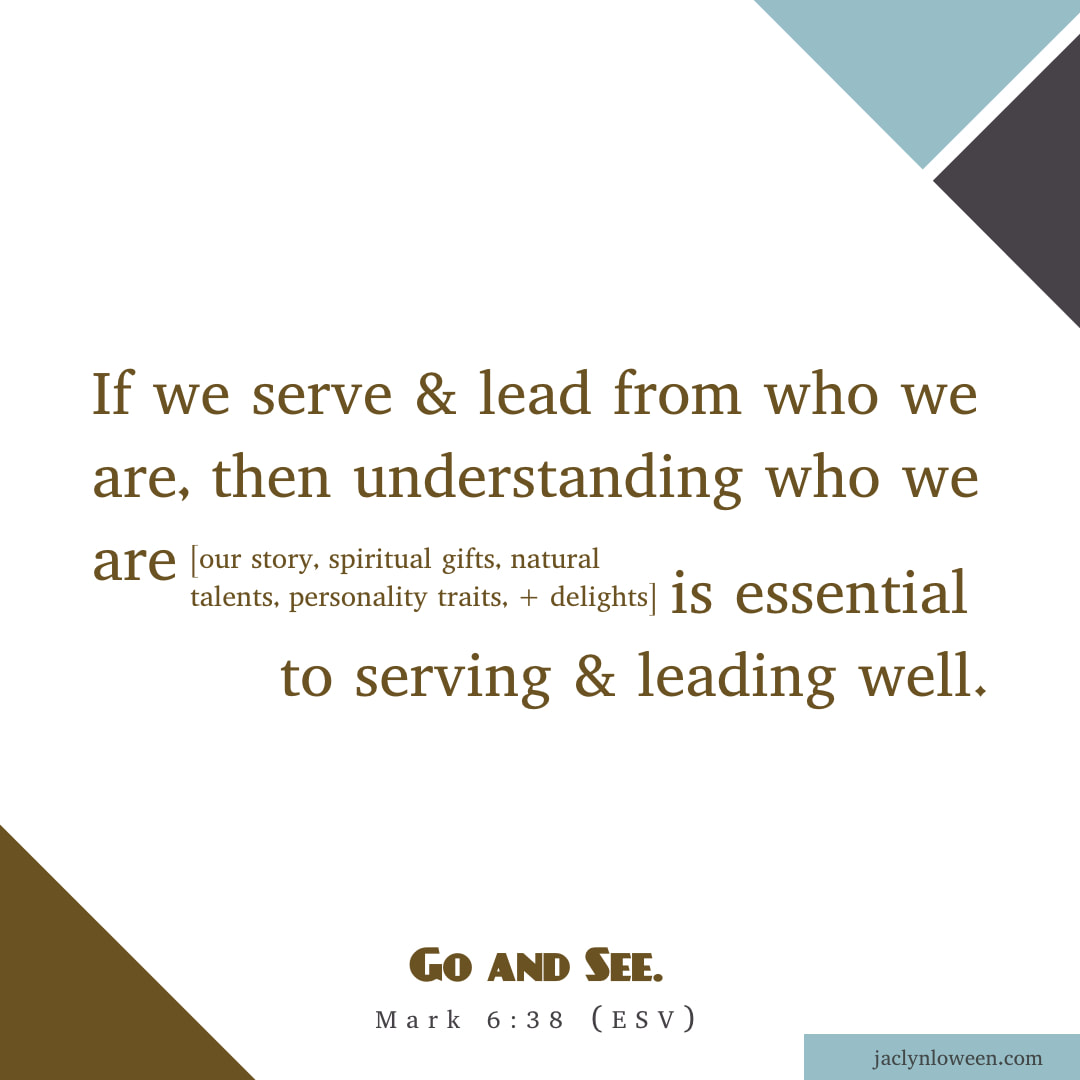

 RSS Feed
RSS Feed